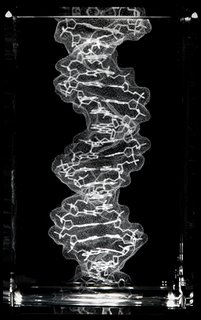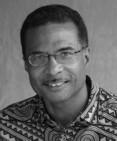Genetic Frontier of the Motherland
...
This is the third column of the Eye on Africa series. I enjoyed researching and writing this piece, although I didn't really get as detailed as I wanted to or perhaps should have regarding the actual genetic controversies. I'm obviously not a molecular geneticist, but I wonder about the issue of databases and genetic markers, particularly if Oprah Winfrey DNA was supposedly traced to the Zulu tribe. According to African Ancestry's web site, they don't have markers for the Ndebeles and the Swazis, who are adjacent ethnic groups and might have similar markers. (They claim to have a marker for Xhosas, another adjacent ethnic group, but that is raises even more questions because the Xhosas are a actually a group of tribes--the Amampondo, Mfengu and Thembu--that speak the Xhosa language. So these become confusing issues with regard to what actually goes into the database.) In Oprah's defense, I read one blog post from someone who claimed to be a member of the Zulu royal family, and he said that Shaka sent a group of Zulu's to the United States for technical education, but they never returned. On the other hand, a lot of South Africans are trying to get away from the tribalism that has been a destructive influence on their history. So why should an American media celebrity claim that she "is Zulu"?
For African Americans, genetic technology in the new millennium is proving to be an unexpected source of knowledge and self-discovery. Incredibly, the tools of modern research are forming an unlikely connection to lost ancestors, broken families and forgotten languages and traditions dispersed by the legacy of slavery. At a time of heightened interest in Africa—when more African Americans are traveling to Motherland than ever before—the link between the Diaspora and Africa is being augmented by the study of DNA.
Thoughts of DNA testing in the Black community might invoke images of forlorn mothers on the Maury Povich Show crying in pain or shrieking vindication as a parade of their hapless boyfriends are brought on camera for the final ‘moment of truth’. Far beyond criminal investigations, paternity suits and court cases, DNA analysis is beginning to have entirely new associations and implications for African Americans. The idea of tracing the DNA of African Diaspora descendents to their roots in Africa is being pioneered by African Ancestry, a company founded in February, 2003 by molecular biologist Dr. Rich Kittles and entrepreneur Gina Paige. Dr. Kittles, began developing his database nearly 10 years ago, as an extension of his academic research. Currently, the company claims it has 20,000 samples in its database, representing about 200 ethnic groups throughout Africa.
The concept for African Ancestry started after Kittles traced his own DNA, and soon became inundated by requests from friends and acquaintances that also wanted to know their own genetic history. Overwhelmed by the work, Kittles eventually partnered with Paige, creating a business that has doubled every year since its launch and has served about 3,000 people. African Ancestry has also attracted media personalities and celebrity clients such as Oprah Winfrey, Spike Lee, actor Isaiah Washington, “Roots” star LeVar Burton, former UN ambassador Andrew Young and California Congresswoman Diane Watson.
“The market found us. It wasn’t something that we were trying to push on the community,” says Paige, a former Fortune 200 company executive. “People were creating the demand and forcing the creation of the company.”
Customers pay $349 for either a MatriClan test for maternal lineage or a PatriClan for paternal lineage. Each kit contains two sterile cotton swabs that are rubbed on the inside of both cheeks, then placed in bar-coded envelopes that are express couriered to African Ancestry for processing. The results are sent back to the customer in 4-6 weeks, and the original samples are then destroyed to protect confidentiality.
Paige is upbeat not only about the company’s prospects, but also about the impact African Ancestry is having on the African American community.
“People have used this in different ways, on local, national, and global levels. Personally, people share information with their family, and they may name a cousin based on the language of their ancestry,” Paige says, enthusiastically. “People have formed study groups, and native associations. There are people who have lobbied their congressmen, and there are people who have invested in their ancestral communities.”
But the work has not been without its controversies. Oprah Winfrey caused a stir during a recent trip to South Africa when she announced that her DNA test results revealed her ancestors were Zulu. Many found this hard to believe, given that Zulus were historically far removed from the West African slave trade. Moreover, the Zulu Empire was an amalgamation of many different ethnic groups conquered by the great warrior Shaka Zulu, which at its height spread from the South African coast through present-day Mozambique and Zimbabwe. Even Mangosuthu Buthelezi, a leading chief of the Zulu nation remarked, “She is sadly mistaken.”
Others have questioned how reliable DNA data can be in determining ancestry for specific ethnic groups, and whether enough genetic markers have been collected and categorized to derive detailed assessments. But Paige is careful in describing her company’s services and cautions potential customers against having wrong expectations.
“Certainly, we don’t have every ethnic group in our database—we have 200 ethnic groups in our database. But we never market that we will find an ethnic group. We market that we can find the country, but if we can find an ethnic group, that ‘s even better,” Paige explains. “In over 85 percent of the cases we find the ethnic groups, but I don’t want people to be misled. We can’t guarantee that we will find the ethnic groups. People who are looking for ethnic groups need to think long and hard about why they are taking the test.”
Notwithstanding the sarcasm and cynicism sparked by Winfrey’s comments in blogs and on message boards, stories abound of individuals who have found personal meaning in their test results. One woman felt “a sense of completion” after her test results confirmed a story her grandfather told her that one of their ancestors was a slave originally from Timbuktu. Another woman, who traced both her mother’s and father’s ancestors to Sierra Leone, traveled to a rural village and pledged to raise funds for a new school complex and a small medical clinic. A Chicago man who learned he descended from the Kru tribe of Liberia became an activist on behalf of his people, many of whom are refugees displaced by Liberia’s civil war.
Civil rights leader and former UN Ambassador Andrew Young, who has traveled and worked in many parts of Africa, traced his ancestry to Sierra Leone and Sudan, countries he had never been active in before. Young feels that DNA analysis is a good resource for African Americans to identify and become involved with specific countries and cultures in Africa.
"What we need now is for people to get deeply involved in one particular country or region or culture, and this certainly is one way that anybody can decide ‘this is where I want to work,’” says, Young, noting that he plans to be more “intrusive and involved” in Sierra Leone and Sudan.
In “Motherland: A Genetic Journey,” filmmakers T. Jackson and A. Baron profile two Black British women and one man who search for their African roots using DNA analysis. One woman is mixed-race, and her test reveals that one of her ancestors was a slave owner, and she visits what used be his sugar plantation in Jamaica. The other woman traces her ancestry to the Bubi tribe of Equatorial Guinea, and has a very emotional reunion on Bioko Island where the people accept her as a sister. The man’s search leads him to an equally emotional encounter with the Kanari tribe in southern Niger.
The award-winning documentary, which aired on BBC and American cable networks, so moved Coloradan Mika Stump that she decided she had to have her own African Ancestry DNA test. Stump—who was recently tested and is waiting for the results—was orphaned when she was 6 after her mother left her in New York City’s Penn Station and never returned. Along with the confusion of her abandonment, Stump has earlier childhood memories of “palm trees and beaches,” suggesting that she and her mother may have come to New York from the Caribbean or a tropical or sub-tropical coastal area. She hopes the test results will help her put together some of the missing pieces of her life.
“It’s everything to me. When people ask me, ‘who are you, where are you from,’ I look at them and I can’t answer,” Stump explains. “It will be amazing if they can pinpoint something and say, this is where I am from. That’s big for me.”The Basalt high country resident believes her DNA analysis will provide her with a reference point where she can begin her research. When she was abandoned, Stump didn’t know her name or her age or her mother’s name, and had to rely on what she was told by medical doctors. Like many others who are exploring the ramifications of DNA testing, Stump is finding a new kind of hope in her quest for a sense of identity and connection with her African ancestors.
For more information on DNA analysis see http://www.africanancestry.com/ and www.uml.edu/dept/biology/rootsproject/africanamericandna.htm


0 Comments:
Post a Comment
<< Home